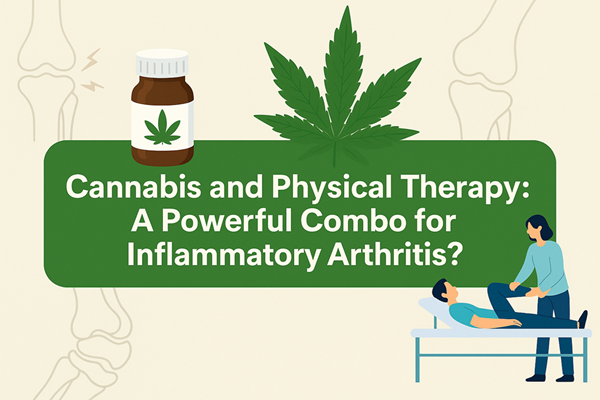Cannabis and Physical Therapy: A Powerful Combo for Inflammatory Arthritis?

Inflammatory arthritis, like rheumatoid arthritis, psoriatic arthritis, and ankylosing spondylitis, can be brutal. It doesn’t just cause joint pain and swelling; it chips away at mobility, energy, and quality of life. Most treatment plans focus on medication and lifestyle changes, but there’s a growing interest in pairing medical cannabis with physical therapy for a more effective, holistic approach.
So, can cannabis and physiotherapy really work together to ease symptoms and improve function? Let’s break it down.
Why physical therapy matters for inflammatory arthritis
Physiotherapy plays a key role in arthritis management. It helps to:
- Reduce joint stiffness
- Improve range of motion
- Strengthen surrounding muscles
- Support better posture and balance
- Prevent long-term joint damage
However, flare-ups and chronic pain can make it difficult for patients to stick to their exercises or even attend sessions. That’s where medical cannabis may offer support.
How medical cannabis can support physical therapy
Cannabis isn’t a magic bullet, but it might help clear some of the barriers that stop patients from fully benefiting from physio. Here’s how:
1. Pain relief
THC and CBD, the two most studied cannabinoids, may help manage the persistent joint pain that often limits physical activity. When pain is under control, patients are more likely to engage in therapy and follow through with movement routines.
2. Reduced inflammation
Early research suggests cannabis may help regulate immune responses and reduce inflammation. This can lead to fewer flare-ups and less stiffness before or after physio sessions.
3. Improved sleep and recovery
Poor sleep is common in people with inflammatory arthritis, and it worsens fatigue and joint pain. Cannabis, particularly CBD, may support better sleep, which helps with recovery between therapy sessions.
4. Mental and emotional support
Living with chronic pain can take a toll on mental health. Cannabis may ease symptoms of anxiety or low mood that often come with long-term conditions, helping patients feel more motivated and less overwhelmed by their treatment journey.
Are there risks?
As with any treatment, there are pros and cons. Cannabis can cause side effects; like dizziness, dry mouth, or changes in mood, and it may interact with other medications. That’s why professional guidance is essential. It’s also important to use strains, formats (like oils or capsules), and dosages that suit your specific needs, not just what’s trending online.
Cannabis and physiotherapy: Better together?
While cannabis won’t replace exercise, it may make it more manageable, especially during tough periods when inflammation and fatigue are at their worst. When used responsibly, medical cannabis can act as a support tool, not a crutch.
Combining it with physiotherapy can create a feedback loop:
Cannabis eases symptoms → you move more easily → movement improves joint health → you rely less on pain relief.
That’s the kind of long-term strategy that gets results.
Getting started with medical cannabis
If you’re dealing with inflammatory arthritis and curious about whether medical cannabis could help, MARUCANNA can assist. They offer quick, confidential assessments and cannabis prescriptions tailored to conditions like inflammatory arthritis.
Check your eligibility for free, fill out a short questionnaire, and, if you qualify, you’ll get a virtual consultation with a doctor. It’s a simple, no-pressure way to explore your options.
Final thought: When paired with evidence-based physiotherapy, medical cannabis may offer a powerful two-pronged approach to managing inflammatory arthritis. Not a cure, but a tool that can make the journey more manageable.


